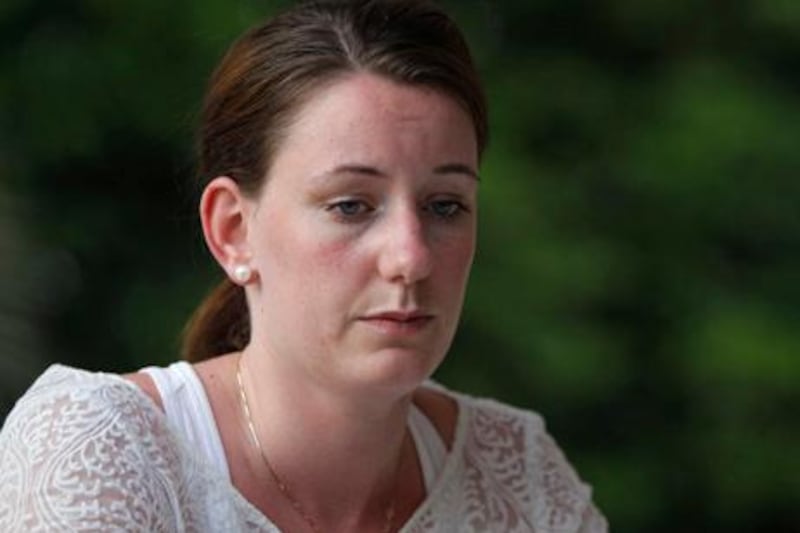It is a case that made headlines around the world; headlines that almost without exception disparaged the UAE's legal system and the way it treats female victims of sexual assault.
"Dubai imprisons Norwegian woman who reported rape" wrote USA Today. Other media outlets, from Europe to Australia, took the same theme. "Raped Norwegian woman jailed in Dubai" was typical.
But a closer examination reveals that even after yesterday's decision to pardon Marte Dalelv, this remains a complex case filled with ambiguities and unanswered questions.
One thing, though, is clear - agreed on not just by the authorities and the police, but by the woman herself: legally, this was not a rape case.
Records of the trial seen by The National provide the most detailed account of the case yet. They also suggest that after Ms Dalelv's retraction of the rape allegations, the authorities had little alternative but to proceed with a prosecution for sex outside marriage and a minimum one-year prison sentence.
In her own words, according to the prosecution, she said: "I told police he raped me while I was still under the influence of alcohol, but I then changed that and I confirm that he did not rape me, but had sex with me with my consent."
In that one sentence, she admitted to not just extramarital sex, but also making a false report, again an offence that automatically carries a prison term, and consuming alcohol illegally.
According to the transcript, Ms Dalelv made the initial complaint of rape early on March 7. A resident of Qatar, she had flown to Dubai for a business meeting.
She told police she had been drinking the previous night at a hotel nightclub on Sheikh Zayed Road with colleagues from her company in Qatar, including HM, 33, a Sudanese man who is married and has three children.
She told the questioning police officer: "I had three glasses of vodka, one mojito and a beer while we were at the club, and I asked HM to protect me from molestation attempts."
In the same account she tells of settling her bill at about 3am, then taking a cab with colleagues, including HM, to the Holiday Inn in Al Safa where they were staying.
In Ms Dalelv's account, she asked HM to take her to her room, but he suggested they stay in his so that he could wake her in time for a morning business meeting.
Photographs from the hotel's closed-circuit TV camera, which were produced in court, show Ms Dalelv entering HM's room with her arm around his waist in one shot, and resting her head on his shoulder in another.
In her account, she then removed her clothes except for her underwear and slept in the bed with HM on a sofa.
Her account stated she woke up at 7.30am "feeling pain", with the man "on top of me having sex with me".
"I tried to push him away several times but he continued what he was doing for about four minutes," she continued.
Afterwards Ms Dalelv says she screamed at her attacker when he went to wash himself, then went to reception where the police were called.
She claims that the officers were all male, that she was given a medical examination for evidence of rape, tested for alcohol and then held in custody for three days.
The account of HM - who has also been pardoned after being sentenced to a year in prison for sex outside of marriage - contests that Ms Dalelv tried to seduce him by rubbing her body against his and making "intimate noises".
He says in his statement that following sex and after washing himself: "I found her crying and asking me why I had raped her."
Six days later, on March 12, Ms Dalelv returned to the police and retracted the allegation of rape, saying that she had made the initial complaint "because I was under the influence of alcohol".
Exactly why Ms Dalelv decided to change her account is still unclear.
In an interview with CNN, she says she began to suspect that the police did not believe her story after her first interview and was advised by a manager at her company that if she admitted the sex was consensual "it would all go away".
A spokesman for the company, Al Mana Interiors of Qatar, has denied this.
He said the suggestion came in Arabic from a police officer and that its representative acted simply as a translator.
Ms Dalelv has yet to give a more full account of what happened in the six days between her claim of rape and her retraction.
On April 9, the company terminated her employment for "unacceptable and improper behaviour", adding in a statement on Sunday that it had been "supportive and communicative" until she "ceased communication" with them.
Her sacking, it added, had nothing to do with the rape allegations.
Her colleague has also lost his job.
If, indeed, Ms Dalelv did believe changing her story would end the matter, it was a catastrophic miscalculation, leaving her defenceless for the eventual court hearing last week in which she was given a year for consensual sex, a month for filing a false report and three months for illegally consuming alcohol - all crimes to which she had effectively admitted.
The pardon means Ms Dalelv will no longer have to wait for her appeal in September to hope for freedom.
But it also means that what happened in that hotel room in March will remain a subject for conjecture and speculation, rather than a simple case of laws that were broken.
salamir@thenational.ae
jlangton@thenational.ae
Facts behind the headlines of the Marte Deborah Dalelv Dubai sex case
Critical response from world media to the sentencing of a Norwegian woman who initially claimed to be the victim of rape did not take into account ambiguities in the story... and questions that, with her pardon, will remain unanswered.

More from the national






